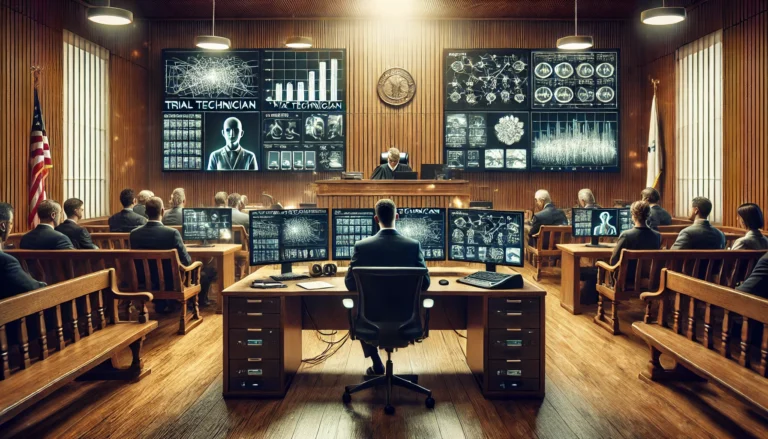Mastering Courtroom Success: The Role of a Trial Technician in Modern Legal Proceedings
In today’s fast-paced legal landscape, the integration of technology into courtroom proceedings has transformed the way trials are presented and managed. Central to this evolution is the trial technician, a professional who ensures that legal teams can effectively utilize technology to present their cases. Whether operating locally or for high-profile national cases, trial technicians have become indispensable for achieving courtroom success.
Who is a Trial Technician?
A trial technician is a legal technology expert who assists attorneys in presenting evidence, managing digital exhibits, and seamlessly integrating technology during a trial. Their expertise ranges from operating courtroom presentation software to troubleshooting equipment issues in real time.
For attorneys who lack technical proficiency, a trial technician bridges the gap between legal strategy and technological execution, ensuring that the case is presented in the most compelling way possible.
The Role of a Local Trial Technician
Hiring a local trial technician provides several advantages, especially for attorneys working in unfamiliar jurisdictions. Local technicians are familiar with the specific courtroom setup, judge preferences, and technological infrastructure, reducing the risk of unexpected issues.
Key Benefits of a Local Trial Technician:
- Cost Efficiency: No need for travel expenses for out-of-town technicians.
- Quick Accessibility: Immediate on-site support in case of last-minute changes or emergencies.
- Local Expertise: Familiarity with regional court systems and their unique technological requirements.
Responsibilities of a Trial Technician
The role of a trial technician is multifaceted, involving both pre-trial preparation and in-courtroom execution.
Pre-Trial Preparation
- Organizing and digitizing evidence, including documents, videos, and photos.
- Setting up trial presentation software such as TrialDirector, OnCue, or Sanction.
- Conducting mock trials to ensure seamless integration of technology.
- Coordinating with attorneys to design a strategy for presenting evidence effectively.
In-Courtroom Duties
- Operating audio-visual equipment during trial sessions.
- Managing real-time exhibits, such as presenting documents on a monitor or zooming in on critical evidence.
- Troubleshooting technical issues quickly to avoid delays.
- Ensuring compliance with courtroom rules and protocols for using technology.
Why Trial Technicians Are Crucial for Modern Trials
The courtroom has evolved from being a purely oral forum to a space where visual and digital presentations play a pivotal role. Jurors today expect clarity and engagement, and trial technicians help attorneys meet those expectations.
- Enhancing Engagement
Studies show that jurors retain information better when it’s presented visually. A trial technician ensures that animations, videos, and diagrams are displayed flawlessly to make a lasting impact. - Time Management
Courtroom time is precious, and a well-prepared trial technician ensures that no time is wasted on technical difficulties. - Competitive Edge
In high-stakes litigation, the use of sophisticated technology can give attorneys a significant advantage over less-prepared opposition. Trial technicians ensure that every detail of the presentation is polished and professional.
Key Skills of an Effective Trial Technician
To excel in their role, trial technicians must possess a unique blend of technical, organizational, and interpersonal skills.
- Technical Proficiency: Expertise in courtroom presentation software and AV equipment.
- Adaptability: Ability to quickly resolve unexpected issues under pressure.
- Attention to Detail: Ensuring every file, slide, and video is flawlessly prepared.
- Communication Skills: Collaborating effectively with attorneys and court staff.
When Should You Hire a Trial Technician?
- Complex Cases
For trials with extensive evidence or multimedia presentations, a trial technician is essential for organization and clarity. - High-Stakes Litigation
When the outcome of a case has significant financial or reputational implications, the seamless presentation of evidence can make a critical difference. - Unfamiliar Jurisdictions
If you’re working in a new courtroom, hiring a local trial technician ensures familiarity with the venue’s technological setup and procedures.
Finding the Right Trial Technician
When selecting a trial technician, consider the following:
- Experience: Look for professionals with a proven track record in your specific case type.
- Certifications: Certifications in trial technology or legal presentation tools can indicate expertise.
- Local Knowledge: For regional cases, a local trial technician offers added convenience and insight.
- References: Check client testimonials and reviews to gauge reliability.
The Future of Trial Technology
As courtroom technology continues to advance, the role of the trial technician will only grow in importance. Emerging technologies like virtual reality (VR) reconstructions, AI-powered evidence organization, and augmented reality (AR) presentations are set to redefine how evidence is presented. Trial technicians will be at the forefront of this evolution, ensuring attorneys stay ahead of the curve.
Conclusion
The role of a trial technician is no longer optional in modern legal proceedings—it is essential. By bridging the gap between legal expertise and technological execution, trial technicians help attorneys deliver compelling presentations that resonate with jurors and judges alike. Whether working locally or on a national level, their contributions are invaluable for achieving courtroom success.
If you’re preparing for a trial, consider hiring a trial technician to elevate your presentation and maximize your chances of success. After all, in today’s competitive legal environment, a well-prepared trial technician can make all the difference.

